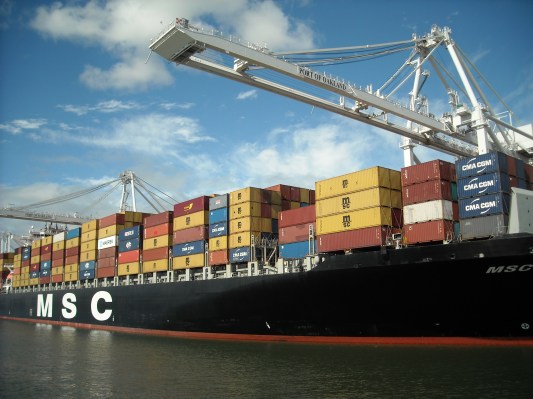It’s a busy day for Docker, the hot enterprise startup that has been taking the world by storm this year, just 18 months after it officially launched as a company. Today, at DockerCon Europe in Amsterdam, the company made a slew of announcements, showing the company is not content to rest on its laurels. The news come just days after CoreOs went straight after it, calling Docker “fundamentally flawed”, while announcing a rival open source container technology.
Docker is ready to strike back (like the Empire) announcing a new set of orchestration tools designed to make life easier for developers, a new “turn-key” enterprise product, its very first commercial product, and a shiny new agreement with IBM.
Docker is a container technology, which provides a way to distribute applications in a highly efficient distributed fashion where you can make changes to pieces within the container while maintaining the overall integrity of the container. This resonates today because instead of large monolithic applications distributed on a single server or hypervisor, companies are building smaller more discrete ones and the container technology from Docker hit a nerve with a changing market. There had been containers before Docker, and new ones are coming along all the time like CoreOS Rocket, but for now, Docker is the king of the hill.
Let’s start with the orchestrations tools because we have to start somewhere and that seems as good a place as any. These are three tools Docker has added to the open source product to make life easier for developers working with Docker containers as they move through the container lifecycle. These tools essentially automate several tasks that required manual intervention before, saving users lots of valuable time.
Docker announced three new tools: Docker Machine, Docker Swarm and Docker Composer.
Docker Machine is an automated way for third-party infrastructure vendors to have a machine ready on their systems so that when developers are ready to send a container to the system, it can process the containers without further intervention from the developer. As David Messina, VP of Marketing at Docker explained, this is a way of accelerating the readiness of Docker Engine. For the uninitiated, Docker Engine is where developers build, ship and run containers
“One of the challenges for developers is setup time getting Docker Engine up and running on specific infrastructure. This allows infrastructure partners like VMware or DigitalOcean to make the engine available to developers and operators through simple commands from a laptop.” As Messina explained, this tool accelerates the time to get running because the infrastructure is Docker-ready.
Docker Swarm lets developers define how to distribute a pool of infrastructure resources across multiple containers in the most efficient way. This allows gives developers to access a set of APIs to link to a tool like Mesosphere to manage the resource pool in the most effective way. As Messina explains it, “Clustering is defining a pool of resources across multiple hosts to schedule where the containers will run based on resource requirements.”
Finally we have Docker Compose, which allows developers to build a container configuration file with a set of containers that make up an application stack. Once created they can easily adjust the file by adding or removing containers from it. Messina explained this provides the means to define a set of containers as belonging together in a simple fashion. “Here is the set of containers, each representing a service that I’m going to assemble with this tool to make it a discrete distributed application,” Messina explained.
All of these tools simplify container management by providing a set of built-in tools to do a number of jobs that required manual handling before this.
Next, we have the new Docker enterprise product called Docker Hub Enterprise, which Messina describes as a turn-key solution companies can install behind their firewall. It’s the first commercial offering from Docker and it’s designed to meet the needs of more security-conscious companies like financial services and give them a starting point for using Docker in the enterprise. Partners include industry heavyweights Amazon Web Services, IBM and Microsoft. The product was announced today, but it will be released in February.
Finally, Docker announced a deal with IBM today where IBM will be acting as a reseller of Docker products. Messina said having a company like IBM as partner is great validation for Docker as a young company and they are welcoming the partnership.
That’s a ton of news and it shows that Docker is continuing to build the product and to try and find new ways to distribute it through a growing partner network. Fact is they have to because the competition isn’t sitting still either.
